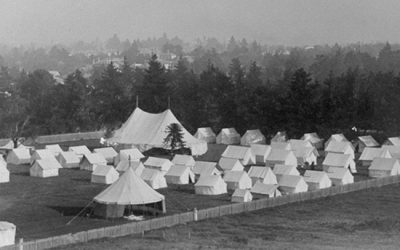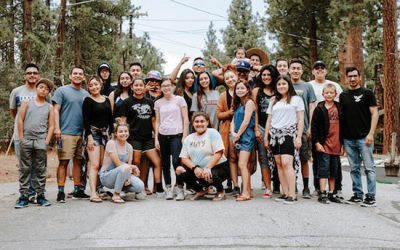School’s out, the sun’s shining, and your kids are thrilled to have the summer ahead of them. Then three days in, you hear, “I’m bored…”
What’s something kids can do that’s fun and active, but also wholesome and constructive? How can they make some great memories over the summer?
These questions lead many parents to look into Christian summer camps.
Seventh-day Adventists, a Protestant Christian denomination, enthusiastically believe in the priceless benefits of this kind of ministry. They offer several Christian summer camp programs across the US, where kids can learn about God while having fun, making friends, learning new skills, and staying active. An unforgettable summer awaits!
Here’s everything you need to know about the many Christian camps the Adventist Church operates:
- Why Adventist summer camps started
- What camp activities do they offer?
- How are Adventist summer camps different from others?
- Who can come to camp?
- When are the camps held?
- What are the benefits?
- Where can I find one?
Let’s jump right in!
Why Adventist summer camps started1
Christian summer camps provide kids with an unforgettable experience of wholesome fun and spiritual growth while experiencing the great outdoors. Grover Fattic—an Adventist youth director in Michigan—had this in mind when he decided to start the first one.
The year was 1927. That year, Fattic planned a 10-day summer camp for boys in Townline Lake, Michigan. It was a smashing success with 18 boys who enjoyed time outdoors and came to know God in a deeper way.
And the girls didn’t want to miss out! So the following year, a camp began for them. Before long, programs sprang up in Wisconsin, California, and New England.
Today, the United States has 67 Adventist camps with a collective of 30 to 35,000 campers attending every year—not to mention the others worldwide!
Let’s learn more about what happens at these camps.
What activities do Christian summer camps offer?
Christian camps are full of highly active and enjoyable outdoor adventures. And as far as the actual activities list, it’s similar to most outdoor summer camp programs across the country.
Here are some common activities you’ll find at an Adventist summer camp:
- Hiking
- Horseback riding
- Bike riding
- Archery
- Geocaching
- Go-karts
- Rock climbing
- Zip-lining and climbing ropes courses
- Wilderness survival
- Sports, such as soccer, volleyball, or basketball
- Water activities, such as swimming, canoeing, boating, rafting, or water skiing
- Arts and crafts
These types of activities never get old or go out of style! Not only are they a step up from most day-to-day things you can do at home, but they allow kids to discover new opportunities and skill-sets.
How are Adventist summer camps different from other ones?

Photo by Ekaterina Novitskaya on Unsplash
So if most of the daily camp activities are similar to other camps, what makes Adventist summer camps different from other camps? Or different from other Christian camps and programs?
At Adventist camps, while there is certainly an overall effort to provide a Christ-centered environment, these summer camps are not the same as “Bible camps,” or programs that are meant to involve seminars and Bible studies.
Our summer camps are operated as a service we can provide to kids and parents. The idea isn’t to convert each camper, but to help them experience the joys of nature and the love of Jesus. All while learning about teamwork and building friendships.
They are also different from VBS (vacation Bible schools), which take place at a church for a couple of hours every night over the course of a week. These involve singing, crafts, and activities for children under the age of 12.
At an Adventist summer camp, the character-building and memory-making take place in action.
Parents can feel at ease sending their children to camp because our guidelines uphold biblical principles, such as the invaluable worth of every human being and the unconditional love of Jesus. And this is all available within a safe environment with healthy meals, regular exercise, and time in the sunshine and fresh air.
(The meals provided will be vegetarian, so as to provide a healthy and inclusive diet for those attending.)
Above all, we want every camper to feel accepted, safe, and loved. Camp staff are encouraged to introduce young people to Jesus not through theological instruction or lists of do’s and don’ts, but through:
- Daily morning devotions—prayer, devotional thoughts, Scripture, and sometimes singing
- Approachability of staff for kids who need encouragement
- Friday evening worship
- Team-building activities
- Nature-focused church programs on Sabbaths
There’s so much we can learn about God just by spending time in nature, learning about everything He created.
Who can come to a Christian summer camp?
Anyone between the ages of 8 and 17 can attend a Christian summer camp.
Most overnight camps are co-ed, with boys and girls housed in separate cabins in separate areas. Each camp program is typically divided by age categories:
- Ages 8–9
- Ages 10–12
- Ages 11–13 (middle school)
- Ages 14–17 (high school)
But many facilities also offer day camp and family camp programs.
Furthermore, some locations have programs for the blind and the deaf. Learn more about the Adventist ministry, Christian Record Services for the Blind, for a directory of their camp programs.
When are Christian summer camps held?
Most Adventist summer camps are open anywhere from 8-10 weeks during the summer, usually from mid-June through August in the United States.
Each camp for a specific age category typically lasts one week, though some camps offer the option of attending for more than one week.
Most Adventist camp facilities also host other events or programs during the rest of the year, when summer camp is not in session.
What are the benefits of Christian camps?

Photo from Unsplash
Christian summer camps offer countless benefits for their attendees. Here are some notable ones:
Wholesome camp experiences—good clean fun!
Campers take a break from digital devices to spend time outdoors. They engage in nature and physical activity—something that can be harder to do at home where there’s limited space, or where it can be easy to get distracted by movies, video games, and the internet.
Spiritual growth
Being out in nature and away from distractions allows campers opportunities for deeper thought and reflection. Kids can connect with God on a personal level while enjoying His creation hands-on.
Here’s some insight from the founder of the Association of Adventist Camp Professionals, Norm Middag:
“Camping helps develop spiritual meanings and values that help [campers] strengthen their character. Lifetime friendships are made through these experiences.”
Another witness to this spiritual growth is Angie Stroud, whose husband Randy is a staff member at Big Lake Youth Camp in Oregon.
To her, one of the biggest benefits of camp is the “exposure to God” that kids get and the way they learn to “have a real relationship with Him through Jesus.”
In 2008, 22 camps participated in a survey about their impact. In over 4,000 responses from staff, alumni, and campers, many said they valued their religion more because of the spiritual activities. The survey also found a connection between time spent out in nature and a young person’s devotion to serving God.2
Character growth and self-esteem
Aside from spirituality, campers grow in other ways. Camp has a powerful impact on the psychological development of children. As they participate in activities pushing them to their limits, they learn bravery, courage, trust, teamwork, and problem-solving skills.
Campers also can build their self-confidence as they discover new activities and skills they haven’t yet known about. For example, maybe one child is discouraged that they aren’t as good at sports as their friends, so they start to think they’re not talented or coordinated. But then maybe they discover swimming, the ropes course, weaving, clay sculpting, or archery—and realize they can indeed find an activity they enjoy or can do well.
Also, for some kids it’s also their first time away from home. A caring, supportive environment at an Adventist summer camp can help them feel safe and secure, while also allowing them to develop healthy independence and responsibility for themselves and their belongings.
Positive friendships

Photo by Robert Collins on Unsplash
In a world where so much happens virtually, the camp experience allows kids to connect in person with others their age. They’re more likely to meet other Christian youth who might have a positive impact on them. It’s not uncommon for lifelong friendships to begin at camp!
Angie Stroud points out that kids usually see their counselors as mentors and look up to them. “I still am good friends with my favorite counselor when I was a camper!” she says.
The new friends made at camp can have an impression that last for life, and even for eternity.
How much does summer camp cost?
Christian summer camps can cost anywhere from $250 to $650. A lot of this depends on the location, the facility, and the program or type of camp selected.
This fee covers a whole week of food, lodging, and activities—plus the many benefits listed above that can’t be measured!
(Compared to the cost of many other types of vacations, this can be considered quite a deal!)
Specialty camps, such as those focused on horseback riding, rock climbing, or white water rafting, may have different pricing.
Find a Christian summer camp near you!
If you’d like to learn more about Adventist summer camps, there may be one near you!
To see a comprehensive list of 60+ camp facilities in 36 states, as well as other locations in Canada, use the directory on the Association of Adventist Camp Professionals website. Australia also has a directory.
For North America, here are just a few of the popular ones:
- Sunset Lake Camp (Washington)
- Mountain View Summer Camp (British Columbia)
- Pine Springs Ranch (California)
- Camp Wawona (California)
- Glacier View Ranch (Colorado)
- Broken Arrow Ranch (Kansas)
- Camp Cherokee (New York)
- Camp Kulaqua (Florida)
All these Seventh-day Adventist summer camps are on a mission to serve families looking for good, constructive, character-building activities that provide unforgettable experiences.
It’s highly likely your kids will come home exhausted from all they’ve done. But it’s also highly likely they’ll come home with cherished memories, new skills, and a revitalized spirit.
Learn more about other ministries for young people that run throughout the year.
- Maran, Kimberly, “Adventist Summer camps Are ‘Youth Evangelism at Its Best,’” Bethany SDA Church Almere, Oct. 18, 2016; William, Wood, “Summer Camp: Where God Spends His Summers,” Adventist Review, May 23, 2012. [↵]
- Wood, “Summer Camp: Where God Spends His Summers.” [↵]
Related Articles
More Answers
Seventh-day Adventist World Population and Demographics
The Adventist Church has more than 22 million members and 100,000 churches worldwide, plus a large system of hospitals, schools, and publishing houses. Learn more about this diverse church.
What Is a Seventh-day Adventist Camp Meeting?
Although camp meetings didn’t begin with the Seventh-day Adventist Church, they’re as much an Adventist thing as haystacks.
Camp meeting is an extended event for Adventists (and non-Adventists) of all ages to gather and participate in spiritual seminars and activities. During the event, attendees often camp in tents, campers, or RVs.
How to Join the Seventh-day Adventist Church
Whether you heard about the Seventh-day Adventist Church through a traveling evangelist, during your online searches, or through a loved one or relative, you might be considering joining yourself.
How Do Adventists Do Baby Dedications?
For Christians, dedication ceremonies for babies, also for older children, are an important time for parents and the church. It’s a special part of the worship service when parents present their young children to God and the church family. Both parents, along with the congregation, regard this as a solemn promise to be a Christ-like example to the child.
Do Adventists Celebrate Communion and Foot Washing?
Like many Christian denominations, Adventists regularly participate in communion, also referred to as the “Lord’s Supper” or the “Last Supper.” They also practice foot washing (John 13:1-20), or the “ordinance of humility,” during the service—which isn’t as common.
What is the Concept of “Present Truth” and Why is it Important?
Present truth is the principle that certain biblical truths are relevant to God’s people at specific times in history. God sends the Holy Spirit to reveal truths that help us better understand how to interpret and apply His Word in a present moment.
Do Seventh-day Adventists Celebrate Easter
Yes, many Seventh-day Adventists do celebrate Easter.
Does the Adventist Church Have Youth Ministry Programs?
The Seventh-day Adventist Church has been organizing and operating youth ministry programs since 1879.
In our opinion, youth ministry is one of the most important ministries a church can have.
Do Adventists Celebrate Birthdays?
Yes, most Seventh-day Adventists do celebrate birthdays because we see them as excellent reminders of the life God has blessed us with. And we celebrate them the same way everyone else does—with friends, family, presents, and a special meal.
What Do Adventists Offer for Young Adults?
In recent years, the age group often classified as “young adults” has been trickier to engage. It’s been a significant concern for Christian churches around the world. Though interestingly enough, similar observations regarding young adults have been coming up in conversations about the economy, the entertainment industry, politics, and more.
Do I Need to be an Adventist to be Saved?
The answer to this question is simply, “no.”
When it comes to salvation in Jesus Christ, all that is required of a person is to acknowledge Jesus’ sacrifice for us, believe that He has saved us, and claim the free gift of salvation that is always available to us. Salvation is not based on denomination.
Do You Have to Be Vegetarian to Be Adventist?
Of course not. Membership in the Seventh-day Adventist Church has never included any dietary requirements. However, there might be some reasons people might think that. So many Adventists are vegetarians or even vegan, and a plant-based lifestyle has many health benefits.
All About Seventh-day Adventist Colporteurs
The Seventh-day Adventist Church uses a variety of methods to spread the hope of the gospel to the world. One of these ways is through colporteuring, also called “canvassing” or “literature evangelism.”
What Is an Adventist Book Center (ABC)?
When you walk into any one of the many Adventist Book Center (ABC) locations, chances are you’ll be greeted by pleasant gospel music in the background, friendly employees, and row after row of Christian books, movies, Bibles, study guides, kids’ games, and more.
Do Seventh-day Adventists Celebrate Holidays?
Wondering whether your Adventist classmate or coworker keeps the same holidays you do? Perhaps you want to include them in some festivities, but you also want to respect their beliefs. Thus, you’re unsure of how to navigate the holiday question. Will they accept your invitation to the office Christmas party?
The Adventist Haystack (It’s Not What You Think) + 4 Recipes
Haystacks are basically a taco salad—with an Adventist spin on it! Most versions are vegetarian and offer an endless combination of tasty toppings. We eat them often because they’re healthy, scrumptious, and easy to make.
Do Seventh-day Adventists Believe in Medical Care?
The Seventh-day Adventist Church believes in and supports evidence-based medical care. In fact, medicine has played a significant part in our history, and today we run a major health system with hospitals, medical schools, and clinics throughout the world.
All about Adventist Elementary Schools
The Seventh-day Adventist Church operates the largest Protestant education system in the world. A big part of this system is our K-8 elementary schools, or primary schools, as they’re known in other parts of the world.
What Are Pathfinder and Adventurer Clubs?
Like the boy or girl scouts, Pathfinders and Adventurers learn about nature and life skills. But what makes these clubs special is their purpose to bring young people closer to Jesus.
A Look at Adventist Colleges and Universities
On the outside, Seventh-day Adventist universities may not look much different than other college campuses. But the real differences are beneath the surface.
What Is ASI (Adventist-Laymen’s Services and Industries)?
ASI, which stands for Adventist-laymen’s Services and Industries, is a membership-based organization that provides support for Seventh-day Adventist laypeople (Adventist professionals who aren’t pastors).
What Are Adventist Evangelistic Meetings?
The Seventh-day Adventist Church puts a huge emphasis on sharing the gospel through evangelism, or sharing the gospel through preaching, teaching, and testimony. One of the ways we accomplish this is by organizing public events called evangelistic meetings.
Do Adventists Have Their Own Bible?
Adventists have some unique beliefs—you might be able to name some of them right now. The seventh-day Sabbath. Death as a sleep. Hell as nonexistence.
What Is Vespers?
Friday rolls around, and you’re spending time with your Adventist friends or relatives when they mention they’re going to vespers tonight.
Adventist Pastors
What is the role of a pastor in the Adventist Church? The position itself, at least as far as a local congregation is concerned, is not much different from that of pastors in other protestant denominations.
The Leadership Structure of the Seventh-day Adventist Church
The Seventh-day Adventist Church has a representative form of structure that connects its 90,000-plus congregations across the globe and gives its members a part in decision-making. Though the Church was incorporated in 1863, this system came about during the church’s reorganization from 1901 to 1903. It includes four levels of organization.
What to Expect When You Go to an Adventist Church
If you’re attending an Adventist church for the first time, you may wonder what it’s really like. While each Adventist church is unique in its collective personality and local culture, Adventist church services are generally similar to most other Protestant church services.
Adventist Education
Seventh-day Adventists have historically upheld the importance of a well-rounded, high-quality education. Instead of a one-size-fits-all approach to teaching and learning, the Adventist Education system operates on the principle of educating the “whole” person.
Evangelism
Evangelism is simply sharing the truths of the Bible with someone else. And Adventists are all into it.
Didn’t find your answer? Ask us!
We understand your concern of having questions but not knowing who to ask—we’ve felt it ourselves. When you’re ready to learn more about Adventists, send us a question! We know a thing or two about Adventists.

































